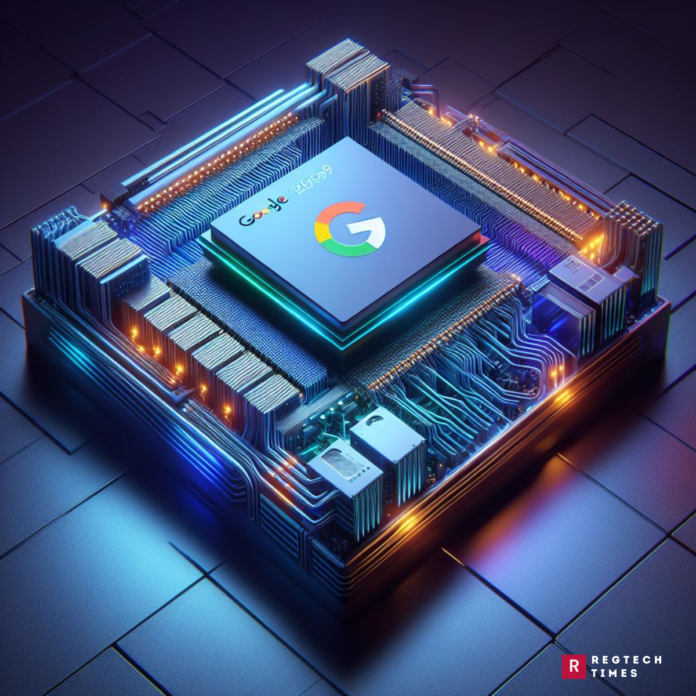Prominent for its technological achievements, Google has revealed its ground-breaking advances in (Artificial Intelligence) AI chips. Google keeps pushing the limits of computing with the release of the Tensor G3 chip for smartphones and the Google Axion Processors for data centers. Let’s examine these groundbreaking discoveries in more detail, as well as how they might affect other industries.
Enhancing Data Center Efficiency with Arm-Based CPUs
Built with the Arm NeoverseTM V2 CPU, Google’s Axion Processors offer outstanding performance and energy efficiency for data centers. These processors have the potential to achieve up to a 30% performance gain in the cloud over current x86 chips and general-purpose Arm chips. Google wants to provide its cloud customers state-of-the-art solutions for their computational needs, with an emphasis on energy economy and higher performance.
Facilitating Seamless Transition to Arm Architecture
Google Cloud’s vice president and general manager of compute and machine learning infrastructure, Mark Lohmeyer, highlights Google’s dedication to ensuring a smooth transition for clients switching to Arm architecture. Google provides an open foundation with Axion, enabling users to use the new CPU without requiring significant program rewriting or re-architecting. Because of its accessibility, companies can take advantage of Axion’s advantages without suffering major disruptions to their daily operations
Advancing AI Capabilities with Google Tensor G3 Chip
Concurrent with its advancements in data centers, Google unveils the Tensor G3 chip, designed specifically for the Pixel 8 and Pixel 8 Pro devices. The Tensor G3 chip, which combines Google’s next-generation TPU, an improved GPU, and the newest ARM CPUs, is intended to improve on-device machine learning capabilities. Google wants to improve user experiences and enable developers to create cutting-edge AI-driven applications by bringing state-of-the-art research on artificial intelligence straight to smartphones.
Driving Industry Transformation: Potential Applications of Google’s AI Chips
Healthcare
The significance of Google’s AI processors in the field of healthcare cannot be emphasized. These chips enable medical practitioners and academics to have access to previously unavailable insights by processing enormous volumes of data at previously unheard-of rates. AI-driven solutions have the potential to completely transform patient care, from aiding in customized treatment through genomic analysis to speeding up the drug discovery process. Additionally, early disease diagnosis is made possible by the integration of AI-powered diagnostics made possible by Google’s chips, which improves patient outcomes and allows for prompt interventions.
Autonomous Vehicles and Safety
Another area that Google’s AI chips have the potential to impact is autonomous automobiles. Robust AI capabilities are required to meet the computing demands of real-time navigation, decision-making, and object recognition. Developers can improve the safety and effectiveness of autonomous vehicles by refining AI algorithms by utilizing the enhanced training and processing capabilities of Google’s chips. Autonomous driving technologies driven by artificial intelligence (AI) have the ability to transform transportation networks, lower accident rates, and reinvent mobility experiences, ranging from long-haul logistics to urban mobility solutions.
Weather Forecasting and Predictive Modeling
Google’s AI chips are poised to make big breakthroughs in weather forecasting possible. Meteorologists are able to produce more accurate and timely forecasts thanks to the exceptional speed and accuracy with which they can now evaluate large datasets including atmospheric conditions, climate patterns, and historical trends. Precision agriculture applications, enhanced resource management methods, and early warning systems for natural disasters are made possible by AI-driven algorithms that drive predictive modeling. Google chips help to strengthen resilience and facilitate informed decision-making in the face of environmental challenges by giving stakeholders practical insights from AI-enhanced weather forecasting.
Google’s unwavering quest for innovation has resulted in the creation of ground-breaking AI chips that have the potential to completely transform computing. With its Tensor G3 chip for smartphones and Axion Processors for data centers, Google is well-positioned to propel major breakthroughs in AI-driven technology across a range of industries. Google’s AI chips are at the forefront of this new era of intelligent computing, with the potential to influence technological advancement and further humankind.



